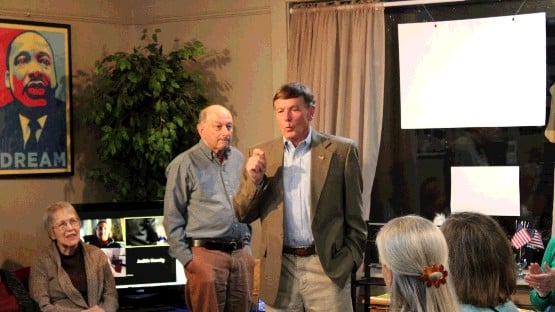
– SB 1248 – Northam
This bill originally implemented the number one recommendation of the Climate Change Commission: the establishment of a mandatory energy efficiency standard under which electricity consumption would be reduced by 19 percent of 2006 levels by 2025.
The 19 percent consumption reduction goal was stripped from the bill; however, the Governor has amended the bill to include a voluntary 19 percent goal with certain incentives to encourage utilities to adopt the goal. This bill will also encourage electric utilities to design, implement, and operate energy efficiency programs through various rate adjustment incentives. The voluntary 19 percent goal is supported by both the electric utilities and the environmental community. While this bill may have a short-term effect of increasing rates, reduced consumption will lead to lower energy bills.
As passed, HB2506 required the Office of the Attorney General to prepare reports on the bill’s effects on rates charged to customers. The Governor finds this clause unnecessary, as the State Corporation Commission must already determine that actions taken to meet the voluntary 19 percent goal serve the public interest. The addition of an OAG report adds unnecessary bureaucracy. As amended, electric utilities will have to file energy efficiency program plans to meet the 19 percent with the SCC only.
This bill originated as an electricity regulation omnibus bill at the initiative of the governor. The bill increases the Commonwealth’s renewable portfolio standard (RPS) goal from 12 percent to15 percent by 2025 to ensure that utilities aggressively pursue renewable energy. It also requires electric utilities to offer to customers real-time variable rates. This will give consumers a tool to lower energy bills and reduce consumption during peak hours – when utilities have to run their most expensive generating plants or buy expensive power to meet demand. The bill also increases payments to customers who generate their own electricity (often via solar or wind power) who can now sell their surplus energy back to the electric grid at the advanced “green-energy rate”. This is a further incentive for the installation of renewable energy systems on private homes and businesses.
The governor has amended the net-metering language so that it conforms to the language in Delegate Toscano’s HB 2155 which more clearly establishes the net-metering provisions.
Renew Virginia bills signed by Kaine include:
– HB 2001 – Cosgrove / SB 1186 – Hanger
The biofuels incentive grant program was adjusted to provide a greater incentive for biofuels produced from cellulosic and winter cover crop sources and algae. Higher support for cellulosic sources will encourage the development of biofuels that do not affect food supply or feed/food prices. Winter cover crops as a biofuels source also help reduce agricultural runoff – which, in turn, helps reduce pollution inputs to the Chesapeake Bay. Cellulosic crops such as switchgrass and other warm season grasses do not require tilling every year and can serve as stream buffers. Algae can be grown to clean up polluted waters and provide a source for biodiesel production.
The legislation also lowers the minimum annual production for a producer to be eligible for the grant to one million tons per year. This will make more producers eligible for the grant and lead to more green jobs in Virginia.
This bill clarifies that solid waste management facilities that produce electricity from solid waste meet the definition of a qualified project under the Public-Private Education Facilities and Infrastructure Act of 2002. This will encourage more of these projects through financial incentives achieved through partnerships. The genesis of this bill is Arlington’s landfill and waste-to-energy plant, where municipal solid waste is converted into enough electricity to supply 23,000 homes. In addition to the energy generated, these facilities can significantly reduce the volume of waste put into landfills.
This bill grants localities the authority to create a clean energy financing program. Originally designed to apply only to Charlottesville, this bill now applies to all localities. With this bill, localities could enter into contract with landowners to install energy efficiency and clean energy improvements. The improvements would be paid for with an assessed fee based on the cost and attached to billings such as water and sewer charges. This will encourage landowners to install green energy improvements and finance the costs over a time period determined by the locality. This will also benefit the various green energy contractors who would install these improvements – further creating a market for green jobs.
– HB 1828 – Fralin / HB 1975 – R.L. Ware / SB 1058 – Whipple
These bills promote incentives for “green roofs.” HB 1975/SB 1058 are companion bills that authorize localities to grant, by ordinance, incentives to promote the construction of “green roofs” on private homes and businesses. “Green roofs” are roofing systems that generate reusable energy (typically solar), and/or roofing systems designed in accordance with the Virginia Stormwater Management Program’s standards and specifications with vegetative roofing and other stormwater control mechanisms.
HB 1994 raises the renewable energy portfolio goal for investor-owned incumbent electric utilities to 15 percent by 2025. A participating utility that meets the specified percentage goals is eligible for a performance incentive.
The Marine Resources Commission may now lease sub-aqueous lands for the purpose of generating electrical energy from renewable sources, transmit energy from such sources to shore, and ensure that any such leases require a royalty. Any money collected through this initiative will be appropriated to the Virginia Coastal Energy Research Consortium. The bill also directs VMRC to determine whether sufficient and appropriate sub-aqueous lands exist to support a commercial offshore wind farm and, if such land exists, offer it for development in a lease auction.
This bill provides that any farm that owns and operates facilities to generate electricity from waste-to-energy technology is excluded from regulation as a public utility. To be eligible for such designation, a person must obtain at least 51 percent of its annual gross income from agricultural operations and produce the agricultural waste that is used in the generation of the electricity. Such generators will be permitted to interconnect to the electric grid in accordance with regulations to be adopted by the State Corporation Commission. The legislation also provides that such generators of electricity shall not be considered “manufacturers” under any provision of the Code of Virginia.
This bill encourages agricultural waste-to-energy production by not hampering the producers of this energy with regulations that are designed for larger utilities.
All of the bills signed advance Gov. Kaine’s Renew Virginia initiative, which will include legislative and executive actions to make Virginia a leader in energy conservation and efficiency and protecting the environment. For more information on Renew Virginia, visit www.governor.virginia.gov.
– Staff Report










